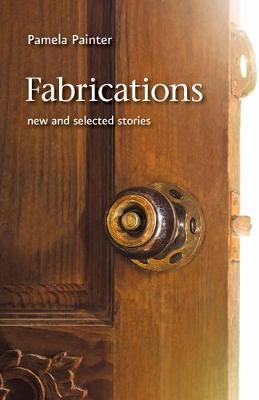
Reviewed by Sherrie Flick
Pamela Painter is part of the flash godmothers and fathers who join sentences to make up the firm base upon which American flash fiction has been built. Writers whose knowledge of the form and skill in rendering it have made so many of us stand back with unhinged awe for decades. Since the invention of the name in the 1992 landmark anthology Flash Fiction: Very Short Stories, edited by James Thomas, Denise Thomas, and Tom Hazuka, readers have read Painter’s compressed and exacting stories.
Fabrications, published in 2021 by Johns Hopkins University Press, is packed full of new and selected works by Painter. Her magnum opus, as it were, with stories drawn from her collections Getting to Know the Weather (1985), The Long and Short of It (1999) Wouldn’t You Like to Know (2010), and Ways to Spend the Night (2016). And although most of the stories selected for this collection don’t fit today’s definition of flash, which is under 1,000 words, they still make use of compression’s craft elements to get them over the finish line.
The collection holds together across these collections, not as traditional linked stories, but as stories that sort through connected ideas and objects from many vantage points. We surf across and over time from story to story, learning the type of character we’ll meet. There are twins and canopy beds, divorce, bitter custody battles, magazines, rain, Boston, and L.A. Painter’s characters tell us their intimate secrets, they behave badly, they get that last drink, they cross state lines, they show us how to tie things together that are just starting to fall apart. And, in the end, many of these stories ask the question: who owns a story once it’s lived? Who gets dibs?
In a new story “Hitchhikers,” Painter explores the idea of storytellers guessing how their own life stories will play out while they’re on their own adventure to the Grand Canyon. They listen to a Cheever audiobook in the car. They pick up dangerous hitchhikers. They wonder as they wander into an unknown future. “So, there. That’s how it went. Probably.” Marcy thinks as she makes up a martini in a hotel room, as she reels back the ditched hitchhikers’ intentions.
The layering and compression of time is an asset to the flash form, and Painter is a pro here as her stories unspool in the continuous present, even with these longer stories.
There are so many wonderful objects that make up these worlds as well. One of my favorites is the CorningWare casserole dish that shows up on p. 212 of the flash story “Driver’s Test.”
“Our Honda is packed tight with my dissertation books, necessary clothes in duffels, and my husband’s hard drives, computers, monitors—all the expensive electronics of a man in touch with the world. The white CorningWare casserole and the transparent glass lid we almost left behind are rattling on top of boxes in the back seat, clattering softly in their Corning way—a sound that could never be mistaken for any other.”
We can all hear it, yes? That glass-on-glass iconic rattle. We immediately have an object and its sound, pushing the story forward nestled into an unlikely mishmash of other domestic objects. Even though this casserole dish is eventually really left behind in a rest area—it’s the chattering dish that creates the tightwire in this story. The chattering propels this couple forward away from their coupledom, but also witnessing them together right now, the chattering reminding them and accusing them of their lost domestic bliss.
There are 31 stories in this collection, and I think each is a gem. Plunge headfirst into its pages and read right through or savor the stories slowly over time. There’s a Painterly quality to it all. You’ve entered the house of a master, and you are safe in her hands.
____________________________
 Sherrie Flick is the author of the novel Reconsidering Happiness and two short story collections, Whiskey, Etc. and Thank Your Lucky Stars. Her stories have been performed for Selected Shorts and appear in Ploughshares, New World Writing, and wigleaf, as well as the anthologies Flash Fiction Forward, New Sudden Fiction, and New Micro. She served as series editor for The Best Small Fictions 2018 with guest editor Aimee Bender and is co-editor for Flash Fiction America, forthcoming from Norton in 2022.
Sherrie Flick is the author of the novel Reconsidering Happiness and two short story collections, Whiskey, Etc. and Thank Your Lucky Stars. Her stories have been performed for Selected Shorts and appear in Ploughshares, New World Writing, and wigleaf, as well as the anthologies Flash Fiction Forward, New Sudden Fiction, and New Micro. She served as series editor for The Best Small Fictions 2018 with guest editor Aimee Bender and is co-editor for Flash Fiction America, forthcoming from Norton in 2022.

 The SmokeLong Grand Micro Contest (The Mikey) is now an annual competition celebrating and compensating the best micro fiction and nonfiction online.
The SmokeLong Grand Micro Contest (The Mikey) is now an annual competition celebrating and compensating the best micro fiction and nonfiction online.